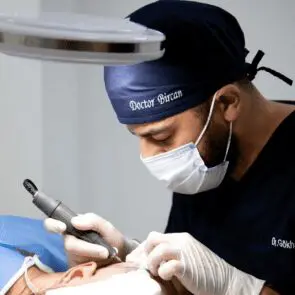Female Hair Transplant in Turkey: Prices, Methods, Tests, and Eyebrow Transplant
Why Do Women Lose Hair?

Hair loss in women is a much more common problem than most people think. Many of our patients ask: “Is hair transplant possible for women?” The answer is yes, but only after a proper diagnosis.
According to statistics, up to 90% of female hair loss cases are caused by diffuse alopecia, which may result from:
-
infections,
-
iron deficiency,
-
hormonal imbalances,
-
postpartum period,
-
certain medications,
-
chemotherapy.
In these situations, a transplant is not necessary — once the underlying issue is treated, hair usually regrows. That’s why during the first consultation we always prescribe tests and recommend seeing an endocrinologist or gynecologist.
However, in about 10% of cases, the cause is androgenetic alopecia (male-pattern hair loss). In such cases, a hair transplant for women is recommended, and we can help restore density and a natural hairline.
Which Areas Are Most Commonly Transplanted in Women?
-
Frontal hairline – to thicken the temples and forehead.
-
Parting line – for localized density restoration.
-
Temporal recessions – to improve the face shape.
Full-head thickening is not effective for women. Transplants are done precisely where needed.
Hair Transplant Methods: FUE and DHI
-
FUE method – used when there is almost no hair in the transplant zone (frontal line, temples). Provides quick and dense coverage.
-
DHI method – ideal if some hair remains (parting line, shallow recessions). Suitable for targeted thickening.
-
Combined method – often chosen for women.
During the online consultation, the doctor determines the method and the required number of grafts.
Do Women Need to Shave Their Hair?
No. Full shaving is only for men. For women, grafts are taken from the donor area at the back of the head, where shaving is done partially and hidden under the hairstyle. After the procedure, women can still wear ponytails or keep their hair loose.
Tests Before Hair Transplant in Women
Before surgery, tests are required to rule out hidden causes of hair loss.
Mandatory tests:
-
Complete blood count (CBC)
-
Biochemistry (ALT, AST, GGT, bilirubin, glucose, creatinine, protein, albumin)
-
Thyroid hormones (TSH, free T4, anti-TPO antibodies)
-
Sex hormones (estradiol, testosterone, DHEA-S, DHT, LH, FSH, progesterone, prolactin)
-
Iron deficiency markers (ferritin, serum iron, TIBC)
-
Vitamin D (25-OH)
-
Zinc and biotin
Additional tests:
-
Thyroid ultrasound
-
Endocrinologist or gynecologist consultation
Hair Transplant Cost for Women in Turkey
Today, Turkey is a global leader in hair transplantation. Women from all over the world come here for natural results at affordable prices.
The average cost depends on the method (FUE or DHI), the number of grafts, and procedure complexity:
-
FUE hair transplant – from $1850 to $2500
-
DHI hair transplant – from $2500 to $3500
-
Combined FUE + DHI – from $2000 to $3500
Usually, the package includes: consultation, surgery, medications, post-care products, transfers, hotel, and translator.
Eyebrow Transplant for Women
Along with hair transplants, many women choose eyebrow transplantation, especially if:
-
eyebrows became sparse after years of plucking,
-
there are scars or areas where hair no longer grows.
The DHI method is used for eyebrows: grafts are taken from the donor area (usually the back of the head) and carefully implanted into the brow line. Each hair is placed at the right angle for a natural look.
Eyebrow transplant cost in Turkey – from $1600 to $2000
We recommend checking out our patient’s review of her eyebrow transplant in Turkey on Instagram.
What to Do and Avoid Before Hair Transplant
✅ Recommended:
-
Complete all required tests (HIV, hepatitis, blood sugar, coagulation test).
-
Inform your doctor about chronic conditions and medications.
-
Follow a light diet 7–10 days before surgery.
-
On the day of surgery, wear comfortable clothes with zippers or buttons.
-
Sleep well and have a light breakfast.
❌ Avoid:
-
10–14 days before – aspirin and blood thinners (unless prescribed).
-
7 days before – alcohol.
-
2–3 days before – smoking (nicotine reduces healing and graft survival).
-
On surgery day – coffee and energy drinks.
-
Hair styling products.
Recovery After Hair Transplant
Recovery for women is identical to men’s. The procedure is performed under local anesthesia, so there is no pain. Mild discomfort may occur only during anesthesia injection (5–7 minutes). Women usually tolerate this better, being familiar with cosmetic injections.
Post-Transplant Care
After the procedure, women receive a special aftercare kit with oils, shampoos, creams, and mesotherapy products to support graft survival. This is used for about 6 months.
From the 2nd–3rd month, PRP injections (platelet-rich plasma therapy) are added. They stimulate blood circulation, nourish the scalp, and help grafts settle faster.
⚠️ Important: PRP does not regrow natural hair, but significantly improves the survival rate of transplanted grafts.
Frequently Asked Questions for Women
❓ Do I need to shave my head before the transplant?
No, only a small donor area is shaved.
❓ When will I see results?
New hair starts to grow at 4–6 months, with full results at 12 months.
❓ Can I have a transplant after childbirth?
Yes, but only after hormonal balance is restored (6–12 months postpartum).
❓ Does hair transplant work for diffuse alopecia?
No. In this case, treatment is prescribed. Transplant is effective only for androgenetic alopecia.
Want to learn more about hair transplant in Turkey?
Simply fill out the form below, and our medical consultants will contact you shortly for a free consultation.
For more real examples of both male and female transplants (techniques are identical, only the patient’s gender differs), visit our Instagram. We regularly share before-and-after cases and educational videos.
Female hair transplant in Turkey is your chance to restore confidence, natural density, and even beautiful eyebrows. Thanks to modern techniques, highly qualified doctors, and affordable prices, Turkey remains a global leader in this field.





